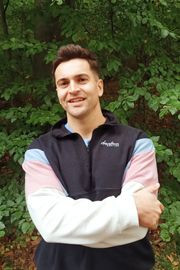 Bernardo Rodríguez Martín
Bernardo Rodríguez Martín
 Computational Biology and Health Genomics
Computational Biology and Health Genomics
- Group page
- Research lines
- Group members
- Publications
Biosketch
From Jan. 2024. - Independent Fellow, Computational Biology and Health Genomics Programme, Centre for Genomic Regulation (Barcelona, Spain).
2021-2023 - Bridging Excellence Postdoctoral Fellow, European Molecular Biology Laboratory (Heidelberg, Germany) and Stanford University (Palo Alto, United States).
2020-2021 - Postdoctoral Fellow, European Molecular Biology Laboratory (Heidelberg, Germany).
2016-2020 - PhD in Cancer Genomics, Universidade de Santiago de Compostela y Universidade de Vigo (Spain).
2012-2014 - MSc in Bioinformatics for Health Sciences, Universitat Pompeu Fabra (Barcelona, Spain).
2007-2012 - BSc in Biology, Universidad de Oviedo (Oviedo, Spain).
Summary
The Repetitive DNA Biology (REPBIO) Team employs state-of-the-art genome sequencing in conjunction with functional multi-omics data to investigate the impact of repetitive DNA on genome function and evolution.
Diverse types of repetitive DNA elements are ubiquitous in the genomic sequences of all eukaryotic organisms, comprising about 50% of the human genome. Specific repeat classes, such as telomeric or centromeric repeat arrays, are crucial for preserving genome function and integrity. Repetitive DNAs also fuel genome evolution by serving as substrates for the generation of regulatory sequences and genetic variation, including disease-causing mutations. Nonetheless, owing to technological limitations for the accurate sequencing of highly repetitive sequences, the repetitive portion of the genome remains a largely uncharted territory, awaiting further exploration.
To illuminate the role of repetitive DNA in genome biology, we harness the latest technological advances to decode nucleotide sequences, including long-read sequencing approaches such as Oxford Nanopore and Pacific Biosciences. A central aspect of our research activities is the development of computational methods for annotating and characterizing repeats, as well as their application to the ever-expanding volume of genomic and functional data.
Through this approach, we also investigate the role of repetitive DNA into the generation of structural variants, a variant class encompassing large genetic changes, including deletions, insertions, inversions or duplications of DNA sequences (Cosenza et al., 2022). In this context, we studied the activity of L1 retroelements in the largest cohort of cancer whole genomes available at that time (Rodriguez-Martin et al., 2020; PCAWG Consortium 2020), uncovering a novel mutational mechanism of structural variation formation in cancer caused by L1 retrotransposition. Together with colleagues from the Human Genome Structural Variation Consortium (HGSVC), we have also pioneered the use of genome assembly approaches to enhance the discovery of polymorphic structural variants and characterize mobile elements (Ebert et al., 2021). This includes inversions (Porubsky et al., 2022), which have been particularly challenging to detect using previous technologies, as they are typically flanked by large repeats known as segmental duplications.
Job Openings
Are you interested in contributing to our mission to explore the repetitive side of the human genome? We are recruiting PhD candidates, please get in contact with Bernardo.
There are not contents at the moment for this section.
Group Leader


